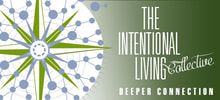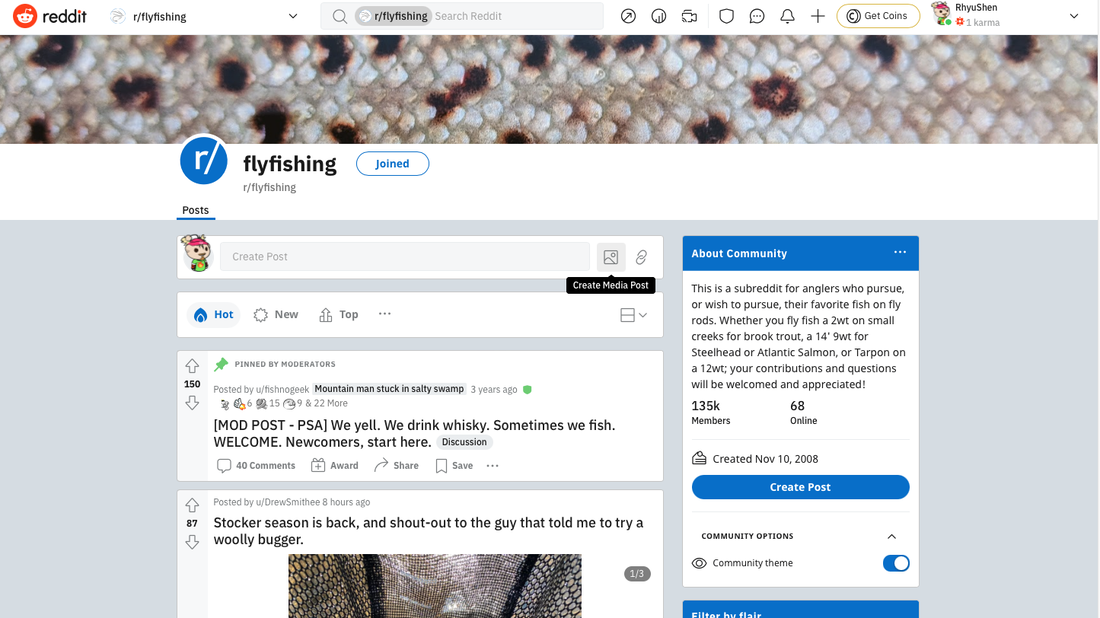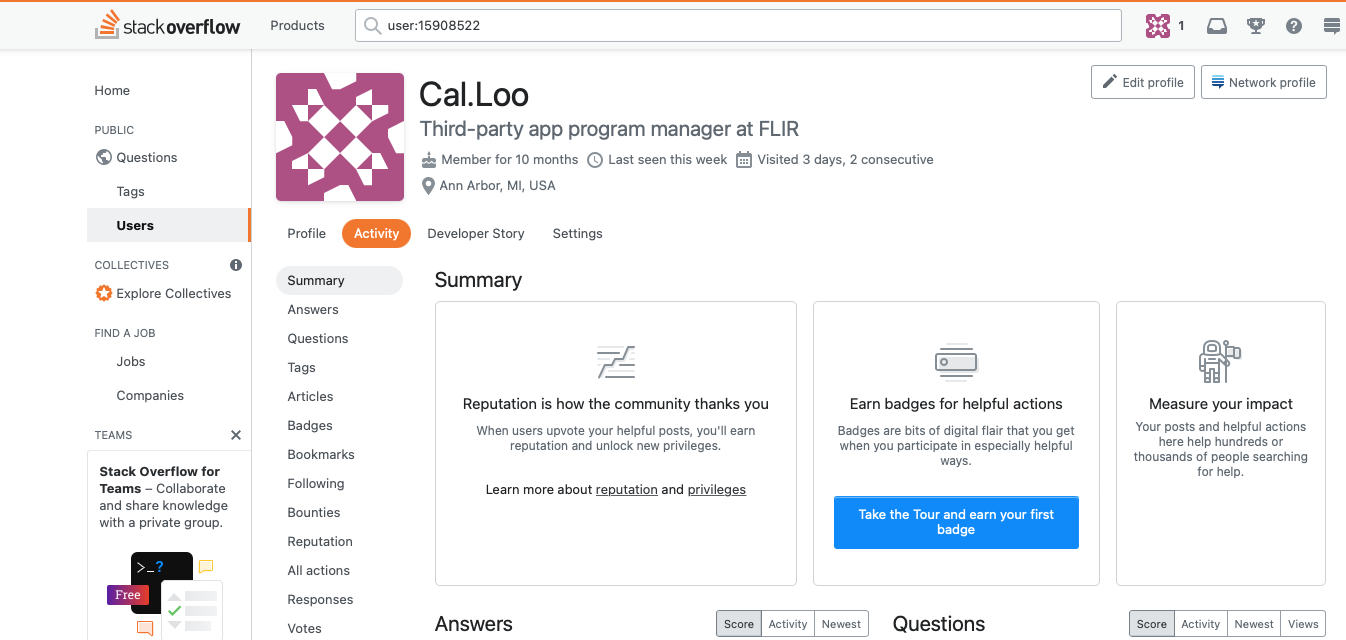|
Finding your people through online groups I ended part 5 of this series by proposing this definition of community: a group of people sharing physical or virtual space that a.) have a particular characteristic or interest in common, b.) create a fellowship with others by investing time and energy into the group, and c.) have a genuine interest in the well-being of the other members. In a time when a lot of people I know - including myself - are feeling isolated, stir-crazy, and sometimes even downright lonely, it helps a ton to have websites and apps that make it easy to find different communities to explore! Facebook Groups makes it easy to connect with specific sets of people - like teammates or coworkers - offering dedicated spaces where you can share updates, photos, or documents and message other group members. If you have a Facebook account you can easily create groups of your own: just choose its name, decide if it’s public or private, visible or hidden, and then invite other members to join. I have to admit, they make it really easy to start and manage groups of your own, and if you’re looking for groups to join I find that Facebook is eerily good at recommending groups for you - offering at a glance groups that are Suggested for You, Friends’ groups, and groups that are Popular near you. Honestly, it’s a little scary at times to realize how much Facebook knows about you, even if they do use the info to connect you to things you’re interested in. Conveniently, Facebook Events is also a good companion to Groups, making it easier to get other members’ attention and keep it. With Facebook’s calendar connection, most people have their Facebook events connected to their smartphones. Another good example is Meetup.com, “… a platform for finding and building local communities.” People use Meetup to meet new people, learn new things, find support, get out of their comfort zones, and pursue their passions. Among a collection of almost 80,000 personal and professional groups from 45,000 different cities, virtually every interest and hobby is covered, ranging from food-related brunch and dinner groups, movie and book clubs, gardening groups, stitching groups, business networking groups, outdoor activities groups, and more. As a self-described community builder, their “Find your people!” tagline resonates with me for sure, and Meetup makes it easy to find events hosted by local groups where you can meet new people, try something new, or just do more of what you love. Once you create your account, just type in a keyword and a location and a list of related groups and events in your area pops up. It’s that easy. Like most of you, I’m ready to get back to doing things with real people in a way that doesn’t include a screen, and as the Michigan winter gives way to spring I’m really, really, REALLY ready to get outside and do something active! Turns out there’s a local group called the Ann Arbor Adventure Club that’s pretty active and it has 6,002 members - and I’m sure some of them are as ready as I am to get out safely and do something fun. Finding and hosting fun and interesting events When it comes to setting up and managing events or finding events that look interesting, Eventbrite has been a go-to for me both personally and professionally. Eventbrite “enables anyone to create, promote, and sell tickets to any event imaginable, while also helping people discover and share events that match their passions.” I’ve used Eventbrite for years to manage the annual Rising Phoenix Awards event when tickets are being sold, and I really like how easy it is to create events, invite people to them, promote them beyond my immediate circle, accept registrations and payments, and communicate with people that register before, during, and after the event. It’s also super easy to find interesting events to attend personally - in fact, as I was doing my research for this article, I did a quick search on fly fishing events in my area, and immediately found a weekend retreat that I want to go to this fall. And there ya go! You should also check out Mighty Networks, who says “It’s time to give your community the platform it deserves. Mighty Networks unlocks a new era of independent communities creating and mastering something interesting or important together.” I have an account and am currently a member of one private group, and I do like how easy it is to communicate with the host and other members about what’s going on in our little community. That same host also offers a “premium” group in which they offer a paid event series, providing a simple and powerful way to offer and manage community offerings. With more of a business approach to communities, Mighty Community “is where creators and brands can build businesses they are proud of.” They offer a Community Design Accelerator Course for $349 that shows how to take your brand, course, ideas, or goals and translate them into a thriving community. Downsides aside, these are really useful sites and apps. It’s not all great – there are downsides to these tools for managing groups and events. First, in online community groups, it can be challenging to keep member information current. In a quick scroll through a list of other members in the Ann Arbor Adventure Club Meetups group, I found several people I already know - which is great - but I saw that the list included one that I know moved away from the area nearly a decade ago and one that passed away about five years ago. While there are certainly a good number of members that are still active, I can’t know for sure how many of the 6,002 people are really still there and engaged. Second, there is the issue of codes of conduct for these groups and their events. It’s appropriately up to the group and event managers to establish and clearly communicate their expectations about member and/or participant behavior, but I find that often there isn’t anything to be found. As a community builder myself, I worry that this leaves the door open for inappropriate behavior that feels emotionally or physically unsafe for some participants. Check out this Sept. 2017 Medium.com article by Mike Roberts for some good thoughts and suggestions about establishing a code of conduct for groups and events that you’re part of. What does a solid code of conduct look like? Here’s a good example of Sketch.com’s code of conduct for meetups: Of all the online community websites and apps I’ve explored in this series so far, these tools for managing groups and events are the ones that I may continue to use even after we launch the Eos Community Connections Portal. While we do plan to offer integrated tools for creating and managing both groups and events, these existing apps offer ease of use and advanced features that are compelling enough that we’ll connect to them and complement them rather than try to supplant them for our users. What we’ll do differently is offer these tools, along with all the other great features in Eos, with consistent use of our Good Human Code of Conduct - which guides members’ behavior across all elements of the platform. Coming up next: What’s the real cost of “Free” apps?
2 Comments
Making connections with previously-unknown speed and scale. If you’re looking to make connections and have real conversations with like-minded people about your shared interests, then online discussion forums can be an amazing place! You can find and engage people that share an interest in virtually any subject with just a few clicks. Impressive as that is, the sheer scale of the engagements you can create may be even more impressive than the speed! Within seconds of signing into my Reddit or Quora accounts, I can literally start or join conversations with other interested users from anywhere in the world. Not familiar? Reddit is an online network of communities where people can dive into their interests, hobbies, and passions. Reddit is broken up into more than a million communities known as “subreddits” each of which covers a different topic. It’s easy to get started by creating your own account, and Jake Widman of Digital Trends offers a decent primer for getting started using Reddit. Quora defines itself as an online place to gain and share knowledge; a platform to ask questions and connect with people who contribute unique insights and quality answers, empowering people to learn from each other and to better understand the world. Deepak Mehta offers a good guide for getting started on Quora in this blogpost. Want some examples of the impressive scale of these kinds of platforms? I’ve been fly fishing for almost 30 years, and I love learning about beautiful new places to fly fish and hearing about others’ experiences catching species that I haven’t. With my Reddit account I can hit the r/flyfishing subreddit and immediately join in conversations with the 135,000 members around the world. Think that’s a lot? The r/interestingasfuck subreddit has 9.3 million members - seriously - and browsing there will take me to interesting places I never would’ve imagined on my own. On Quora, I can choose the topic addiction & mental health and get immediate access to posts by or Q&A threads involving 8 contributors and 17,900 followers. I can also just dial up the topic of mental health and jump in with 108 contributors and 46,000 followers. The internet has enabled us to connect with other people in ways never before possible, enabling us to share data, information, opinions, and feelings with speed and scale never possible before. Getting help, finding help, and seeking a diversity of opinions. So what do you DO with all these connections? Sure, you can gain and share knowledge from reading others’ posts and even participating in chats with them - these ARE discussion forums, after all! At a high level you can start to feel like you belong to a larger, online “community” of people that share an interest in a particular topic, and you can even form friendships with the people you connect with there. These platforms can also make it easy to get help from other members of that “community,” allowing you to gain information you didn’t already have, hear perspectives and opinions that are different from yours, and even get personal references to other helpful people or organizations that aren’t already directly involved in the conversation. I’ll use Stack Overflow - an online community for app developers that lets them learn, share their programming knowledge, and build their careers - as an example. In a former role as the third-party app developer program manager for a company in Sweden, I had to build a community of app developers all interested in creating mobile apps using our software and hardware technologies to transform smartphones into legit thermal cameras. We created an in-house website that included a dedicated discussion forum, but I also realized that we needed to meet the developer community in a more public place to make it easy for them to communicate with us and with each other, so I created an account on Stack Overflow. I found that the developers I worked with tended to use the in-house discussion forum to communicate directly with my colleagues and our technical support team, while using Stack Overflow more often to interact more freely with each other where they felt more open to share opinions, things they learned, and information about other helpful resources. They learned from, supported, and complained to each other; they formed connections beyond what they were working on for my program, and they helped each other build their experiences and career paths. The dark side of all these online connections and discussions. To be honest I’m not spending much time at all on these discussion forums outside of work right now, for a number of reasons. First, as I mentioned in an earlier post, information overload is a real thing, and I found myself getting overwhelmed with posts and responses in the discussion forums that I found to be irrelevant, un-interesting, or “off-key” for my tastes. Everyone is welcome to their own opinions of course, but I don’t need to hear all of them and I definitely don’t want to hear them from people that are being rude or disrespectful. On the other side of that issue, I don’t personally find satisfaction or a sense of connection from the many impersonal, shallow responses I encountered. Second, personal safety is a real concern on multiple levels. Most discussion forum platforms offer engagement rules that instruct people to be good to each other (like Reddit’s “Be Civil” policy and Quora’s “BNBR” (Be nice, be respectful) policy), but realistically online platforms often give people a sense of anonymity, so they’ll say things in ways they normally wouldn’t. If the platform’s rules and enforcement policies and processes don’t have enough teeth, then there is no true accountability for the things users say online. It can feel mentally and emotionally unsafe to put your authentic thoughts, feelings, and opinions into that space. Further, there are documented cases where some users have threatened other users’ physical safety - and really, who has time or energy for that? Third, data security issues are also a real thing. This 2019 Digital Trends article about a security breach at Quora that affected about 100 million users is downright scary. A clear commitment to protect users’ data is a good place to start, and an explicit commitment to never sell users’ data is even better. More on that in a future post. (Photo credit Douglas County Sheriff) In the first post in this series I explored what exactly a “community” is, and these two definitions served as a starting point: Community (noun): a group of people living in the same place or having a particular characteristic in common. Also: a feeling of fellowship with others, as a result of sharing common attitudes, interests, and goals.
Closing out this post about discussion forums I’d like to suggest a better definition: Community (noun): a group of people sharing physical or virtual space that a.) have a particular characteristic or interest in common, b.) create a fellowship with others by investing time and energy into the group, and c.) have a genuine interest in the well-being of the other members. That’s the kind of online community I’d like to be part of, and I’m honored to be part of the team creating it in the Eos Community Connections portal. Coming up next: Event management platforms. |
Cal LooFather. Son. Brother. Friend. Business owner. Change agent. Social entrepreneur. Ordained ceremonialist. Outdoors enthusiast. Fly fisherman. Community builder and connector. Archives
July 2022
Categories |
- Home Page
-
Community Content
- Cal's Blog
-
Resources for Life Transitions
>
- Life Transition Zone - animated
- LTZ Ambassadors
- Upcoming LTZ events
- Joining Community & Immigration
- Parenthood
- Coming of Age
- Marriage or Union
- Abuse
- Job or Career Change
- New Business
- Human Trafficking
- Addiction & Recovery
- Divorce or Uncoupling
- Homelessness
- Military Life Transitions
- Health Crisis
- Grieving
- Emerging Self Awareness
- Crowning (Aging and Claiming Sovereignty)
- Upcoming Events >
- Our Programs
- About
- Sponsorships
- Contact Us
Site powered by Weebly. Managed by iPage









 RSS Feed
RSS Feed